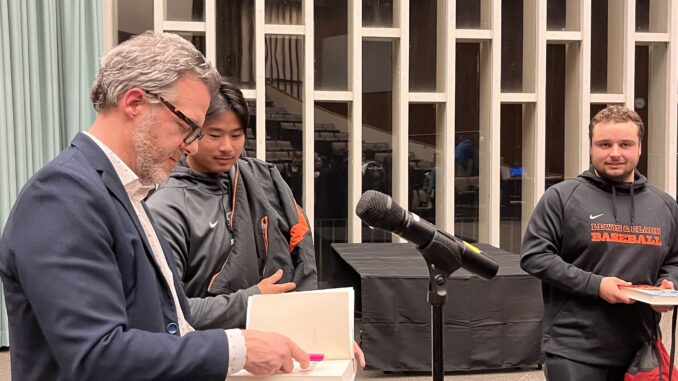
Chris Blattman takes interdisciplinary approach to explain poverty, conflict in keynote on his debut book
On Feb. 21, the economics department invited Professor Chris Blattman to give this year’s annual Mattersdorf-Steinhardt Lecture, focusing on global conflict, crime and poverty.
Blattman is the Ramalee E. Pearson professor of global conflict studies at the University of Chicago, in the Harris School of Public Policy and The Pearson Institute. He also serves as the co-lead of the University’s Development Economics Center and the International Policy and Development program at the Harris School. Prior to this, he taught at Columbia University and Yale University after receiving a PhD in economics from UC Berkeley and Master’s Degree in Public Administration and International Development from Harvard University.
His work has been featured in many prominent news publications, and he is a contributor to the Washington Post’s Monkey Cage, as well as maintaining his own personal blog.
Assistant Professor of Economics Aine McCarthy introduced Blatmann at the event, citing his research abroad as well as his distinguished career as an educator.
“Chris was a part of a new generation of economists who saw research on poverty as an active and participatory process,” McCarthy said in her introduction. “He immersed himself in the community.”
The talk, which lasted just over an hour including a question and answer segment, focused on the root causes of war, and their relationship with impoverishment and economic uncertainty. The well-attended lecture drew a considerable crowd, and guests received free copies of Blattman’s book, “Why We Fight: The Roots of War and The Paths to Peace.”
Blattman’s appearance at LC coincides with the book’s recent release, which has received positive reviews in the Washington Post, the Wall Street Journal and the Economist. His writing focuses on his current work with armed groups, gangs and organized crime. Utilizing qualitative interviews, large-scale surveys, statistical analysis and field work, Blattman conducted examination of case studies all over the world before synthesizing the research into his book.
“I don’t really think of it (the book) as about economics,” Blattman said. “Like the idea of the planes (example relating to selection bias) belongs to all social scientists in the sense that isn’t selection on the dependent variable… And I think that’s true throughout.”
The book was written to communicate complex concepts at expert levels as well as novice, and full of ideas that many people might not know they already understand.
Blattman’s interdisciplinary career is apparent in the book. He utilizes a mix of economics, international relations and game theory in his analysis.
“(Game Theory) is just thinking strategically, and that’s not only the province of economics, it’s actually the province of a lot of areas of study. So it’s like trying to demystify it and not make it feel so scary by making it relatable,” Blattman said. “Everybody who’s ever played a game of poker understands all the game theory in the book already. They just don’t realize they understand.”
Blattman rejects the common notion that war is an irrational, emotional decision with a multitude of possible catalysts. In “Why We Fight” he posits the idea that there are five root causes of war: unchecked interests, intangible incentives, uncertainty, commitment problems and misperceptions. While different conflicts may look like they vary drastically in focus, he writes, they are still rooted in similar motivations.
As both a professor and speaker to audiences at large, this has proven a challenge to communicate.
“Most people don’t think about conflict to live in a systematic way,” Blattman said. “You’d be surprised. So for example, when I was at the Pentagon, I got the same questions in the Pentagon audience as I get from a group of undergraduate students.”
When writing his book, Blattman had to balance the professorial interest in educating with his own academic pursuits — a tall order when distilling a years-long research pursuit into a comprehensive work for the public at large. On a world stage where conflict is ever-growing and causing anxiety and uncertainty about the future, a message of rationality can be hard to convey other than get heard among a sea of fearmongering.
“(Fearmongering) is the way to get on CNN and sell books,” Blattman said. “I think you sell more books if you say the United States is going to have a civil war than if you say otherwise, and that’s the sad state of things.”
The challenges of presenting economics and social sciences to a polarized audience are only a part of his work. Blattman is still a full-time professor, engaged with his students and invested in the success of younger generations in academia.
“The greatest asset students have right now is time and flexibility,” Blattman said. “When I went to college, nobody studied abroad, it was super weird. And now, there’s just this set of opportunities that people once imagined were much more constrained … I think the big change I’ve seen the last 20, 30 years is the scope of what a university student thinks they can do.”
“Why We Fight” is available now at major book retailers and can be rented from Aubrey R. Watzek Library.
Subscribe to the Mossy Log Newsletter
Stay up to date with the goings-on at Lewis & Clark! Get the top stories or your favorite section delivered to your inbox whenever we release a new issue.

Leave a Reply